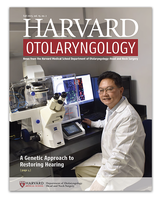
The Harvard Medical School (HMS) Otolaryngology–Head and Neck Surgery Department maintains an active basic and applied research program that represents a broad range of areas in otolaryngology–head and neck surgery. Many of our clinical faculty members are actively engaged in research projects and we have a large contingent of full-time research faculty. All laboratories are available for resident participation in research training.
Research Track Residency
The HMS/Mass. Eye and Ear Otolaryngology–Head & Neck Srugery residency program offers one research track position each year. Supported by a T32-training grant from the NIDCD, the research track residency includes a total of seven years of training:
- One year of general surgery (including six months of ORL)
- Four years of otolaryngology–head and neck surgery
- Two years devoted entirely to research training
These dedicated research years occur between PGY-2 and 3. Research track residents are free of any required clinical duties during this period. While there are opportunities for cross-coverage (“moonlighting”) and assisting with surgical cases to keep clinical skills in shape, it is entirely voluntary. A re-entry program is provided in the final months preceding return to clinical work. Additionally, a supplemental book fund is available to help cover costs of educational materials or conference travel.
Candidates for the T32 research track residency are interested in pursuing careers as physician-investigators in areas such as basic, translational, health services, health policy, or clinical otolaryngology research. The presence of several renown institutions filled with eminent faculty in Boston make cross-campus collaborations a commonplace for T32 residents.
See below for work from recent and current T32 residents:
2011–2013
Dunia Abdul-Aziz, MD
Toward hair cell regeneration: Hic1 regulation of Atoh1
Mentor: Albert Edge, PhD
Work site: Mass. Eye and Ear
2012–2014
Rebecca Hammon, MD
Role of apoptosis in the response of HNSCC to Cisplatin treatment
Mentor: James Rocco, MD, PhD
Work site: Mass. Eye and Ear
2013–2015
Elliott Kozin, MD
Optogenetic control of the auditory pathway
Mentors: Christian Brown, PhD, and Daniel Lee, MD
Work site: Mass. Eye and Ear
2014–2016
Brian Lin, MD, MSc
Risk factors for hearing loss in prospective cohorts
Mentors: Gary Curhan, MD, ScD, and Konstantina Stankovic, MD, PhD
Work site: Brigham and Women’s Hospital
2015–2017
Anuraag Parikh, MD
Multiplexed immunofluorescence based quantification of partial-EMT to predict adverse clinicopathologic features in oral cavity squamous cell carcinoma
Mentors: Derrick Lin, MD, and Bradley Bernstein, MD, PhD
Work sites: Mass. Eye and Ear, Mass General
2016–2018
Vivek Kanumuri, MD
Flexible multimodal neuro-prosthetics for the ABI, CI, and facial nerve
Mentors: Christian Brown, PhD, and Daniel Lee, MD
Work site: Mass. Eye and Ear
2017–2019
Suresh Mohan, MD
Enhancing axonal penetration through cross-facial nerve grafts
Mentors: Nate Jowett, MD, and Tessa Hadlock, MD
Work site: Mass. Eye and Ear
2018–2020
Vinay Rathi, MD
Alternative payment models in otolaryngology
Mentor: J. Michael McWilliams, MD, PhD
Work site: Brigham Health
2019–2021
Phoebe Yu, MD
2020–2022
Christopher McHugh, MD
2021–2023
Ryan Bartholomew, MD
2022-2024
Lucy Xu
Clinical Track Residency Research Opportunities
Clinical track residents will identify a research project to work on throughout their training and will present annually on their progress. Five months of residency are dedicated to research time, separated into two 10-week blocks occurring in the PGY-3 and PGY-4 years.
Examples of Past Resident Research Projects:
- “Piezoelectric sensors for implantable otologic microphones”
- “The role of apoptosis in the response of HNSCC to Cisplatin treatment”
- “Effects of secreted factors from human vestibular schwannomas on murine cochlear cells”
- “Valuing patient preferences”
- “Toward improved outcomes for chronic rhinosinusitis: An economic analysis of sinus surgery”
- “Toward hair cell regeneration: Hic1 regulation of Atoh1”
- “Insurance status and disparities in healthcare utilization in the United States: Acute rhinosinusitis”
- “Global surgery: Access and macroeconomics”
- “The role of simulation in otolaryngology training”
- "Improving outcomes and outcome evaluation in functional septorhinoplasty"
- "Intracochlear pressures in superior canal dehiscence"
- "Mapping tumor heterogeneity in head and neck cancer"
- "Reimagining the Auditory Brainstem Implant"
Global Health Research
In addition to research in the Boston area, there are ample opportunities for research in global surgery through Mass. Eye and Ear.
Core Grant Recipients
2011
Sunshine Dwojak, MD
“Outcomes among American Indians in South Dakota with squamous cell carcinoma”
2012
Rebecca Hammon, MD
“The role of apoptosis in clinical response of HNSCC to Cisplatin therapy”
2013
Dunia Abdul-Aziz, MD
“Epigenetic regulation of hair cell differentiation”
Elliott Kozin, MD
“Optogenetic control of auditory neurons using a new generation opsin”
2015
Taha Jan, MD
“Effects of secreted factors from human vestibular schwannomas on hearing”
Sidharth Puram, MD, PhD
“Identification of intratumoral subpopulations in oral cavity SCC”
2016
Yin Ren, MD, PhD
"Tumor-penetrating delivery of nanoparticles to human vestibular schwannomas"
2017
Jenny Chen, MD
“Smartphone technology to improve intraoperative feedback”
Ashton Lehmann, MD
“Perisotin as a biomarker for chronic rhinosinusitis”
2018
Vivek Kanumuri, MD
“Optogenetic stimulation of the facial nerve”
Suresh Mohan, MD
“Enhancement of axonal penetration through cross-facial nerve grafts”
2019
Adeeb Derakhshan, MD
“The effect of electrical stimulation on schwann cell states along nerve grafts”
Allen Feng, MD
“Biomechanical analysis of force loadings during suspension microlaryngoscopy”
2020
Shekhar Gadkaree, MD
"Geographic and Socioeconomic Barriers to Access to Care in Otolaryngology"
Alan Workman, MD
"Murine Model of Cystatin-Induced Coagulation Pathway Derangements in CRSwNP"
2021
Roy Xiao, MD, MS
"Visualizing the Mechanism of End-to-Side Motor Neurorrhaphy"

